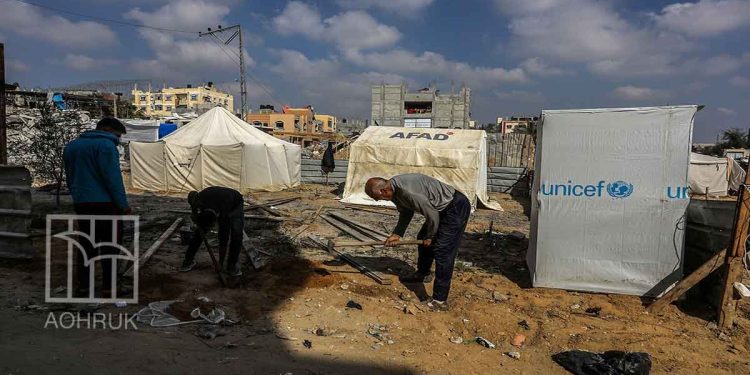The humanitarian ordeal of some 1.5 million displaced Palestinians in the Gaza Strip has intensified after torrential rain, swept in by a severe weather front, submerged thousands of tents and makeshift shelters where families have been living for nearly two years since the war launched by the occupying forces on the enclave.
The Government Media Office in Gaza said the stormy conditions have starkly exposed the fragility of the displaced population’s living situation, as worn-out tents turned into pools of water and mud, while fierce winds tore away large sections of them, leaving tens of thousands of families without any shelter to shield them from the cold and the rain.
In a statement, it explained that winter’s forceful arrival has worsened a humanitarian catastrophe already unfolding for two years, with displaced families living in unsanitary conditions, unprotected from the rain or the wind, in a scene that epitomises an ever-expanding crisis.
The statement added that suffering in the Strip has not abated despite the ceasefire, as severe restrictions imposed by the occupying forces on the entry of aid, including food, medicine, shelter materials, and reconstruction supplies, have persisted, leaving tens of thousands of families exposed to the elements or living in decaying tents.
According to government estimates, the Strip now requires no fewer than 250,000 tents and 100,000 caravans to provide temporary shelter for the displaced, particularly as most existing tents are no longer fit for human habitation. Around 93 per cent of them, 125,000 out of 135,000, have become unusable.
For its part, the Palestinian Civil Defence reported that dozens of tents in the al-Mawasi area west of Khan Younis were completely submerged in rainwater, noting that its teams are working under extremely difficult conditions to respond to flooding incidents and assist the displaced.
Observers describe the living conditions of the displaced as a flagrant violation of the right to adequate housing, and of the rights to life and human dignity, amid the absence of basic necessities and the difficulty of securing water, food, and healthcare. The prolonged period of forced displacement has also compounded psychological and social harm, especially among children, most of whom are living in tents with no insulation or protection.
The war waged by the occupying forces, which began on 8 October 2023 and continued for two years, has killed more than 69,000 Palestinians and injured over 170,000, alongside massive destruction that has ravaged around 90 per cent of civilian infrastructure, with initial losses estimated at roughly $70 billion.
Although the ceasefire has halted military operations, the scars of the onslaught remain deeply embedded in the lives of millions of civilians who are now fighting to survive under siege and the forces of nature.
The worsening crisis in the displacement camps lays bare severe breaches of international humanitarian law, which stipulates that civilians in times of conflict must be afforded at least the minimum protections guaranteeing safe shelter and a living environment that preserves human dignity.
Yet the reality of displacement in Gaza reflects an almost total collapse of these standards, with millions living in coercive conditions, dependent on tattered tents that offer no protection from the weather. The recent rainfall became a harsh test, exposing the fragility of what little remains of their means of survival.
These conditions also highlight a continuing failure to uphold moral and legal obligations towards the civilian population, both by the occupying power, which maintains effective control over border crossings and supplies, and by the international community, which has been unable to ensure the delivery of aid or secure even the most basic emergency relief.
This situation raises urgent questions about the efficacy of international mechanisms for civilian protection in conflict contexts, as hundreds of thousands of displaced people are left to face rain, cold, and hunger under threadbare tents, with no guarantees, no protection, and no clear horizon for ending their suffering.




























